Erstellt am: 16. 9. 2014 - 14:53 Uhr
Einsam gegen den Rest der Welt
Der Mann, der mir nun schon zum dritten Mal zum Interview gegenübersitzt, strahlt eine außerordentliche Ruhe aus, er wählt seine Worte sorgfältig. Anton Corbijn ist einer, der auch seine Projekte genau auswählt und lange überlegt, ob er jemanden fotografiert, einen Videoclip dreht oder gar einen Kinostreifen. Ein Mensch, eine Idee, ein Thema muss ihn schon enorm fesseln.
Jetzt gibt es einen neuen Film von Corbijn, "A Most Wanted Man", ein leiser Thriller über die (Ohn-)Macht der westlichen Geheimdienste und vermeintliche islamische Terroristen, über das Klima der Angst, das unsere Welt dominiert.
Die zermürbte Blick von Hauptdarsteller Philip Seymour Hoffman als deutscher Spionageboss schließt dabei nahtlos an die Figuren in den bisherigen Filmen von Anton Corbijn ein. "Control" zeigte die letzten Tage von Joy-Division-Sänger Ian Curtis vor dessen Selbstmord, "The American" folgte George Clooney als Auftragskiller, der mit allem abgeschlossen hat, in die italienische Abgeschiedenheit.
Einzelgänger, Drifter und introvertierte Typen, die unbeirrt ihren Weg gehen, faszinieren den Niederländer generell, er schießt Bilder von ihnen, beobachtet sie, sucht ihre Nähe. Nach seinen Videoclips für Bands wie Depeche Mode oder U2 und berühmten Portraits von Stars wie David Bowie, Miles Davis, Elvis Costello, Clint Eastwood, Dennis Hopper oder Nick Cave will er sich jetzt ganz auf das Medium Film konzentrieren.
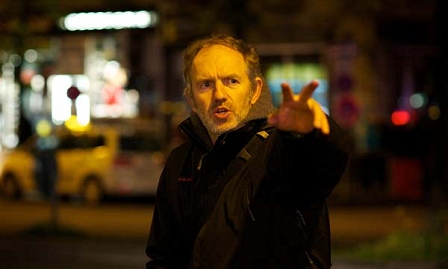
Constantin
Agentenkino ohne Action
"A Most Wanted Man" is a very unusual thriller. What made the book by John Le Carré attactive for you?
It is the underlying theme of the book. The post-9/11-world, the world that polarizes us all very quickly, and the way we look at people that are different and how we judge them. I think that's personally what interested me.
There are some genre elements in this film, but it seems the characters, the dialogues and the overall atmosphere are everything for you...
It's not a Jason Bourne kind of spy thriller or James Bond, that's a very different world in which this kind of movies are operating. John Le Carré was also the executive producer and an advisor to the film. One of the things we looked into was how spy work is done these days. It is very mundane, it's just sitting and waiting and watching - and there's not a lot of action. (lacht) We show the realistic side of spying.
How difficult is it in today's Hollywood climate to sell a spy film without any glamour, action or sex?
Yeah, the audience, especially in America, likes fast-paced films, fantasy action and all that kind of stuff. People don't always want to look at the reality and the world they really live in. So it is difficult, sure, but it's a good story, we have great actors in it. There is still place to make films that are put together intelligently and maybe question things. You can look at beautiful acting and I think that is really important. And there is enough suspense that makes it gripping without a lot of violence or action. The violence is slightly more subtle, I guess.
Have you maybe been a little bit inspired by dialogue-based paranoid thrillers from the 70ies-New-Hollywood-Era?
In general I like movies from the 70s. Not always the camerawork but the lack of the fast editing, the pacing of it and the way you can observe a character in a film. I feel that body movement and the way a person walks is an element of a character and I like watching that. In a lot of modern films it is very hard to see how someone really walks, because they immediately cut into something they want you to look at. And I'm quite happy to look at things that are happening in a slightly wider scale on screen. That doesn't have to be pinpointed so much.
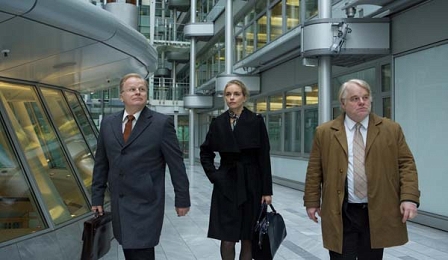
Constantin
Ein unersetzbarer, ehrlicher Mann
There is an element of melancholy in this film that also seems to be in "The American" and obviously in "Control", it is in some of your video clips and photos. Is this something that attracts you in art in general?
I guess, maybe it's something that is kind of part of me. What I like about these stories is that they tend to be about lonely guys and how they fight the world in a way. Without romanticising it too much, but I quite like that core element of the character to be a loner.
Philip Seymour Hoffman is perfect in this role of the loner. When did you think about him for the casting?
As soon as we decided to make the movie international. First we thought to make it a German film but that didn't work in terms of financing it. So Philip became the lead and the one actor to go to. I was very happy that we managed to persuade him, because I think he was such an outstanding actor, it would have been very hard to replace him. Because when it is in your mind the one actor you want to have – where do you go for when he doesn't want to do it? So, that is difficult. And that is also the big loss that Philip is gone now. You look back at all the movies and you realize: There is no one to compare him to.
Can you describe your work relationship with him?
Both as a director and as an actor, when you start a film, it's always difficult because you have to get used to each other and how you operate. Does he give me enough or am I director enough to the actor? He might question that and I might question what he is doing there. In Philip's case, once he came to the film set, that character was more or less formed and there was very little that needed to be changed or altered. But there are still moments where we saw things differently and that was really good because that way we established a really clear personal and work relation with each other.
That sounds like great chemistry between the two of you....
Yes, Philip said, now we have to make some more movies – and that was the idea because I liked him enormously and he was an incredibly likeable man. He was not a bullshit guy, he was an honest actor – somebody who always believed in the honesty of the character he had to play. There was no vanity and that's very rare in the movie world. And that made him so believable.
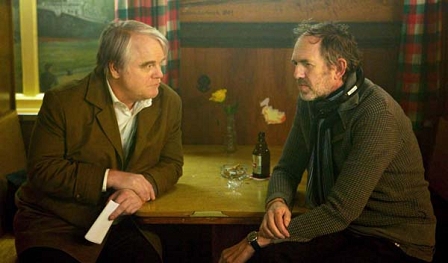
Constantin
Kämpferische Seelen
Philip Seymour Hoffman almost always played fragile characters in a way, did he seem like a troubled man himself?
I'm not sure that he always played such characters, I don't know if this is true. He played some very special characters, for sure, and the greatness of his acting is that he can make a quite normal guy very extraordinary by all the answers he seeks and put into that character. I don't have a quasi-intelligent analysis of Philip's state of mind, I don't think that he deserves that, and I don't think I know enough.
I'm sorry if this question sounded too personal...
He was an artist and it's fair to say that he was a troubled soul. Which is not uncommon, I work always with artists, musicians and painters and a lot of them are troubled souls, because you try to create and creation doesn't come easily always. And that's why I like these characters and think some of them are magicians, some others don't. I’m attracted to people who struggle. And I think that makes some of these people beautiful souls.
There are many conspiracy theories surrounding the kind of politics we see in this movie and the people behind this theories agree that in the end it's all about money. Do you think there are other motivations? Like patriotism or ideology?
Well, I think in the film in a way everybody believes they are doing the right thing. And not for the money. They believe they do the right thing for their own lives or for their country. And some of those I would say, have the right idea, but others not. Bachmann, played by Philip, is a good guy and he looks at the bigger picture. And some of the other people don't really look at the bigger picture, they make situations worse. But yeah, I firmly believe that a lot of problems in the world have to do with economics, more so than with ideology.
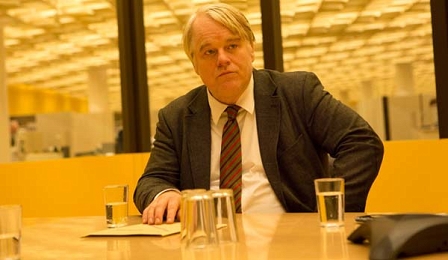
Constantin
Angst als unsichtbarer Gegner
Would you agree that all the people in the movie are motivated by fear?
I think that is a correct assumption. The fear is the antagonist that we don't see. They all betray each other and they're all thinking they do it for the wellbeing of the other person. This is a really interesting concept (schmunzelt). Yes, fear of something that they can't put the finger on or fear of what might happen - and therefore we take action. So it's judging situations without knowing enough about it.
Without spoiling the movie for anyone, but it ends on a very pessimistic note. What is your personal opinion of the problems we see in this film? We're right now in a timespot where terrorist groups put beheadings on Youtube, do you think the paranoia will even grow in the next years?
Well, I personally don't watch these videos on Youtube, because I find this violence so intrusive on a subconscious level that I do not even want to see this. I believe it when I read it. But like I said, it's a polarised world and if the ending is quite pessimistic, it's my personal view of that. And that's why I wanted to make a film about it, I feel that mankind has entered a final phase. And I like to be wrong but I fear that I might be right.
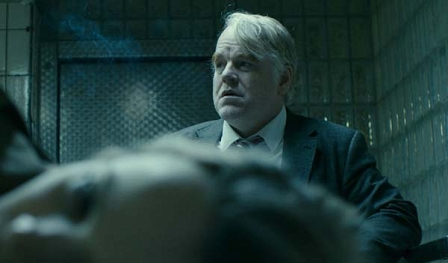
Constantin
To talk about something optimistic, your next project – I think you already work on it – is the portrait of a photographer. Can you tell me more about it?
Sure, my next project is a little bit more life-affirming. It plays in 1955 and is about a photographer called Dennis Stock. He is not a household name but he took a very famous picture that most people will know, which is a photo of James Dean on Times Square in the rain with a long black coat and a cigarette. This film is about the relation of this photographer with James Dean and how they influenced each others lives. It plays in early 1955, is called "Life" and I nearly finished the editing. The movie will be out next year.
But maybe the photographer will be a very melancholic man...
Perhaps. And maybe this James Dean was a lonely guy, who knows.

